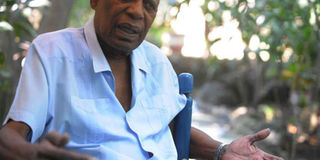Head of Haiti's voodoo religion dies

In this February 24, 2010 file photo, Supreme chief of Haitian voodoo, Max Beauvoir speaks during an interview with AFP in Port au Prince. Max Gesner Beauvoir, the supreme chief of the voodoo religion, died September 12, 2015 at the age of 79 in the Haitian capital, his relatives announced. PHOTO | AFP
What you need to know:
- Beauvoir, a biochemist by training, was named in 2008 the "National Ati," or spiritual guide for voodoo practitioners. The title was created to defend Haiti's historic religion from increased attacks from some Protestant churches and Evangelical preachers.
- In 2010, influential US televangelist Pat Robertson stirred controversy when he claimed that the earthquake that struck Haiti that year was caused by "a pact to the devil" that Haitians swore in 1804.
PORT-AU-PRINCE
Max Gesner Beauvoir, the supreme chief of the voodoo religion, died Saturday at the age of 79 in the Haitian capital, his relatives announced.
Beauvoir, a biochemist by training, was named in 2008 the "National Ati," or spiritual guide for voodoo practitioners. The title was created to defend Haiti's historic religion from increased attacks from some Protestant churches and Evangelical preachers.
In 2010, influential US televangelist Pat Robertson stirred controversy when he claimed that the earthquake that struck Haiti that year and killed more than 200,000 people had a demonic origin.
Robertson claimed that the quake was caused by "a pact to the devil" that Haitians swore in 1804 when they rose against the French colonizers to obtained independence.
Beauvoir worked hard to counter negative stereotypes of the religion and explain voodoo to foreigners, and even opened the religion's temple to the public during important religious ceremonies.
At the start of Haiti's 2010 cholera epidemic, scores of voodoo practitioners were lynched by people who accused them of creating a powder that spread the disease.
Voodoo was part of the culture of the African that were enslaved and taken to Haiti in the 1600s and 1700s.
Banned during the French colonization period, those who practice voodoo seek to engage with supernatural spirits who protect followers and bring them into contact with an invisible world.
The ceremonies include rituals copied from Christian rites, though the religion is routinely attacked by many Christian churches.





